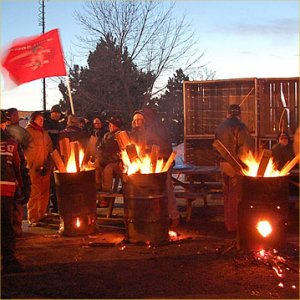Viewpoint: CAW Committed to Militancy, Movement Unionism

Labor activism has never been limited to a single tactic or channel. It is this point that Herman Rosenfeld fails to recognize in his Viewpoint criticizing the recent direction of the Canadian Auto Workers union (see Labor Notes February 2008).
CAW activism got off to a bold start this year when, during the last weekend of January, CAW workers at a Kitchener, Ontario, tool-and-die shop occupied the plant. The owner had closed its doors and locked out workers, declaring bankruptcy and refusing to assign severance pay. The company, Ledco Limited, demanded a 25 percent cut in wages and a 20 percent cut in benefits, which our union refused.
Workers at Ledco, whose seniority ran anywhere from 10 to 40 years, joined their CAW Local 1524 leadership along with other CAW local union activists, leaders, and staff to loudly and clearly demand the severance pay the workers deserve.
The Ledco take-over was the second plant occupation in less than a year. The first was last March, when workers at the auto parts company Collins & Aikman in Scarborough, Ontario, took over the plant once they learned the company was planning to ship out the remaining parts, close, and short-change the workers.
Exchange on
Militancy in the CAW
Herman Rosenfeld:
Canadian Auto Workers Moves from Fighting Back to Cooperating, February, 2008
Jim O'Neil:
CAW Committed to Militancy, Movement Unionism, March, 2008
Herman Rosenfeld:
Things Aren’t Always What They Appear to Be, April, 2008
These are challenging times for working people and our union, with unfair trade, the move to low-cost Third World producers, and a high Canadian dollar wreaking havoc on the country’s industrial base.
Under current Canadian bankruptcy laws, workers are given last priority. It is crucial that working people, brought together by unions, fight back against the companies and governments that put them in a distant last place, far behind banks and other creditors. Because of the courage of these CAW members, each worker got the severance pay for their years of service.
RUBBER STAMP?

SUPPORT LABOR NOTES
BECOME A MONTHLY DONOR
Give $10 a month or more and get our "Fight the Boss, Build the Union" T-shirt.
Not a day goes by that we are not called on to defend our members’ interests somewhere in Canada. Especially challenged to defend our members are the rank-and-file national executive board members who Rosenfeld inaccurately refers to as “rubber stamps.”
The board was formed at the same time as the Canadian union, after breaking away from the UAW in 1985. The creation of the board was (and still is) rooted in the belief that rank-and-file leadership has a critical role to play in building the union.
This 17-person body is also a sounding board for major decisions made by the union, and has been the site of intense discussion since its creation. Board members are elected by other rank-and-file members and are recognized as leaders.
Those who question the validity of the internal debate need look no further than the debate that erupted over the CAW-Magna Framework of Fairness, an agreement signed in October. During our numerous meetings across the country, rank-and-file members (including those on the board) freely gave their opinions, both for and against the deal.
ON A LARGER STAGE
It is naïve to suggest that government plays no role in corporate investment decisions, these same decisions that hold our members’ job security and livelihood in the balance. The CAW recognizes this role with a militant presence both in the streets and provincial and federal legislative bodies.
Our union has led the fight to stop the erosion of manufacturing jobs, the spread of the Delphi disease (two-tier wages and benefits) to Canada, and to raise public awareness of the unfair trade in vehicles from Japan, South Korea, and the European Union. Our union has successfully delayed and maybe even stopped the signing of a deal with South Korea that would have been disastrous for working people.
At the same time, we are building the confidence and understanding of our members that concessions will not save or create jobs. Years before the two-tier system became commonplace in the United States, the CAW developed a no-concessions policy, which was the main reason for breaking away from the UAW and has been a cornerstone of the union’s bargaining agenda ever since.
FACING THE CHALLENGE
We are also a union committed to social justice and very proud of this record. Locally and nationally, we are leading the fight to maintain a high quality of life for all people, while building strong ties in many progressive movements, like the global justice, anti-poverty, and anti-war movements.
CAW members have also been at the forefront of campaigns for universal health care, affordable day care, gay rights, and bringing an end to violence against women.
The CAW has a long and proud history of militant activism guided by our commitment to do what’s best for working people. This commitment requires us to constantly challenge the conventional thinking that could prevent us from moving forward.
The labor movement is facing an undeniable challenge of retaining its relevance as fewer and fewer working people are able to identify themselves as union members. Our collective energy needs to focus on how we build a strong, vibrant labor community for the future, and not on endlessly reminiscing about the past.





